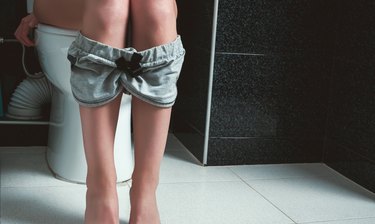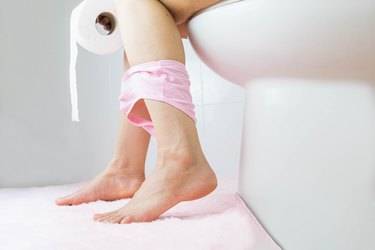
If you're experiencing the burning and pain of a urinary tract infection, it's understandable why you'd look to potential natural remedies like cherry juice for UTI relief.
However, there's no clinical evidence to suggest tart cherry powder, cherry juice or any other cherry product can help with bladder infections or UTIs. Some people may confuse cherry juice with cranberry juice, which has a much broader — although conflicting — set of clinical studies to back its use for urinary tract infections.
Video of the Day
Video of the Day
Here, learn about the benefits of tart cherry juice along with the best time to take tart cherry juice versus cranberry juice.
First, What Are UTIs?
A urinary tract infection, or UTI, can affect any part of the urinary system, including the bladder, kidneys, ureters or urethra, according to the Department of Health and Human Services (HHS). People with uteruses are particularly at risk because of their shorter urethras, which open right next to the anus and vagina — both ready sources of bacteria — and ultimately allow bacteria quicker access to the bladder.
Symptoms of a UTI can include the following, per the Centers for Disease Control and Prevention (CDC):
- Pain or burning while urinating
- Frequent urination (including getting up to pee at night)
- Feeling the need to urinate despite having an empty bladder
- Bloody, cloudy or strong-smelling urine
- Pressure or cramping in the groin or lower abdomen
Does Cherry Juice Help a UTI?
There is no evidence that cherry juice or any other form of cherry product will help relieve or prevent a UTI or bladder infection.
The typical course of treatment for a UTI begins by visiting your doctor, who will prescribe a course of antibiotics to clear up the infection and perhaps an over-the-counter product for UTI symptom relief, such as AZO or a non-steroidal anti-inflammatory drug (NSAID) like Advil for pain. They may also suggest drinking lots of fluids to help flush out the bacteria, per Michigan Medicine.
Cherry juice can be among these fluids because cherries aren't known to irritate the bladder, but there's also no particular benefit to drinking cherry juice rather than plain water.
And keep in mind that beverages high in sugar — which could include some types of cherry juice — might contribute to UTI symptoms, according to a June 2013 study in the American Journal of Epidemiology. So you may want to limit your intake.
Whatever you decide to drink in the meantime, it's important to see your doctor as soon as possible for treatment. If left untreated, a UTI or bladder infection could move into your kidneys and cause permanent damage to your health.
Tip
Over-the-counter supplements, including cherry supplements, can sometimes interact with medications or have unexpected side effects, especially if you have a health condition. Always talk to your doctor before taking a supplement.
What About Cranberry Juice for UTIs?
Cranberries have been studied more than any other fruit for their usefulness in treating urinary tract infections. But the clinical evidence for cranberry's usefulness in promoting a healthy urinary tract is conflicting, according to the Cleveland Clinic.
One big problem? The research many people point to — a June 2016 study in the American Journal of Clinical Nutrition — was funded by Ocean Spray, a company that sells cranberry juice. The conflict of interest calls the study results into question.
Beyond that, some reviews have found cranberry to be an effective way to manage recurring UTIs, while other reviews have found no such connection.
As with cherry juice, you can drink cranberry juice to stay hydrated when you have a UTI, but it's best to limit your intake and choose juices without added sugar.
What Else Helps With a UTI?
The only clinically proven way to treat a urinary tract infection is to take a course of antibiotics as prescribed by your doctor. While you're waiting to see your doctor or for the antibiotics to take effect, you should stay hydrated and consider taking an over-the-counter pain reliever to ease your symptoms.
If you struggle with recurring UTIs, though, there are several things you can do to help prevent an infection, according to the Cleveland Clinic:
- Wipe properly: Especially if you have a vagina, make sure to wipe from front to back to keep bacteria from your anus away from your urethra.
- Stay regular: Having constipation or diarrhea can up your chances of getting a UTI, so take steps to keep your bowel habits regular: Stay hydrated, eat a high-fiber diet and get regular exercise.
- Drink water: Getting enough fluids can help flush out bacteria that could potentially lead to an infection.
- Choose your contraceptive wisely: Avoid spermicide or barrier contraceptives like a diaphragm; talk to your doctor about other options.
- Talk to your doctor: Speak with your health care provider about prescription options that might work for you, such as topical estrogen for postmenopausal people or a single dose of oral antibiotic that can be taken before or after sex.
- HHS.gov: "Urinary Tract Infection"
- Michigan Medicine: "Urinary Tract Infections in Teens and Adults"
- CDC: "Urinary Tract Infection"
- American Journal of Epidemiology: "Intake of Caffeinated, Carbonated, or Citrus Beverage Types and Development of Lower Urinary Tract Symptoms in Men and Women"
- Cleveland Clinic: "Can Cranberry Stop Your UTIs?"
- USDA: "Cherry juice, tart"
Was this article helpful?
150 Characters Max
0/150
Thank you for sharing!
Thank you for your feedback!
Is this an emergency? If you are experiencing serious medical symptoms, please see the National Library of Medicine’s list of signs you need emergency medical attention or call 911.


